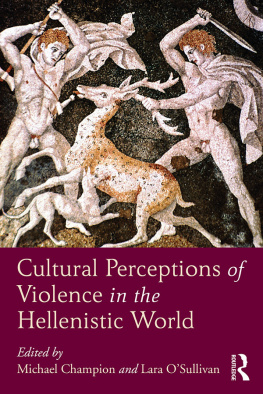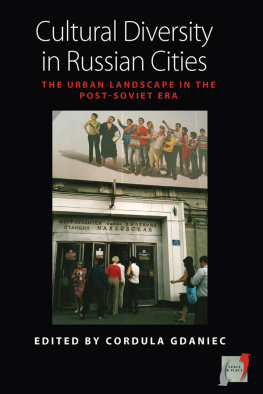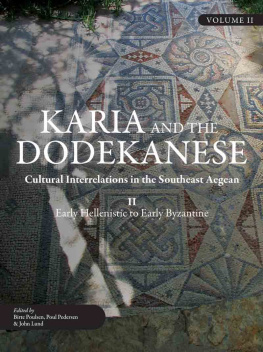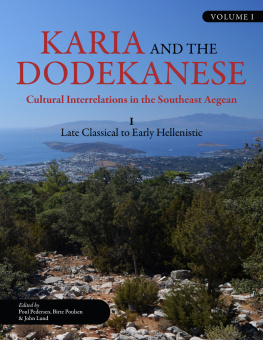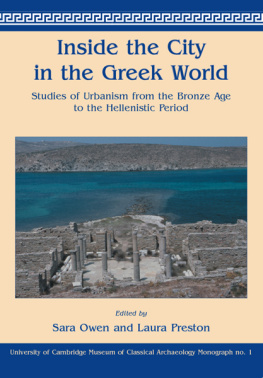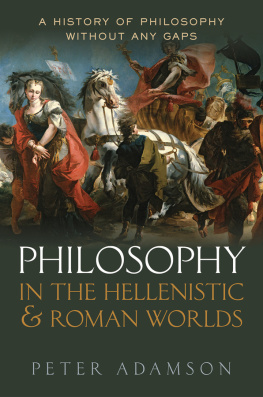
p.i
Cultural Perceptions of Violence in the Hellenistic World
Violence had long been central to the experience of Hellenistic Greek cities and to their civic discourses. This volume asks how these discourses were shaped and how they functioned within the particular cultural constructs of the Hellenistic world. It was a period in which warfare became more professionalised, and wars increasingly ubiquitous. The period also saw major changes in political structures that led to political and cultural experimentation and transformation in which the political and cultural heritage of the classical city-state encountered the new political principles and cosmopolitan cultures of Hellenism. Finally, and in a similar way, it saw expanded opportunities for cultural transfer in cities through (re)constructions of urban space. Violence thus entered the city through external military and political shocks, as well as within emerging social hierarchies and civic institutions. Such factors also inflected economic activity, religious practices and rituals, and the artistic, literary and philosophical life of the polis.
Michael Champion is a senior research fellow in the Institute for Religion and Critical Inquiry at the Australian Catholic University. He is the author of Explaining the Cosmos: Creation and Cultural Interaction in Late Antiquity (2014) and co-editor of Understanding Emotions in Early Europe (2015).
Lara OSullivan is a lecturer in Classics and Ancient History at the University of Western Australia. She is the author of Demetrius of Phalerum: A Philosopher in Politics 317307 bce (2009). Her main research interests lie in classical and Hellenistic Athenian history and culture.
p.iii
Cultural Perceptions
of Violence in the
Hellenistic World
Edited by Michael Champion and
Lara OSullivan

p.iv
First published 2017
by Routledge
2 Park Square, Milton Park, Abingdon, Oxon OX14 4RN
and by Routledge
711 Third Avenue, New York, NY 10017
Routledge is an imprint of the Taylor & Francis Group, an informa business
2017 selection and editorial matter, Michael Champion and Lara OSullivan; individual chapters, the contributors
The right of the editors to be identified as the authors of the editorial material, and of the authors for their individual chapters, has been asserted in accordance with sections 77 and 78 of the Copyright, Designs and Patents Act 1988.
All rights reserved. No part of this book may be reprinted or reproduced or utilised in any form or by any electronic, mechanical, or other means, now known or hereafter invented, including photocopying and recording, or in any information storage or retrieval system, without permission in writing from the publishers.
Trademark notice: Product or corporate names may be trademarks or registered trademarks, and are used only for identification and explanation without intent to infringe.
British Library Cataloguing-in-Publication Data
A catalogue record for this book is available from the British Library
Library of Congress Cataloging-in-Publication Data
Names: Champion, Michael, editor. | OSullivan, Lara, editor.
Title: Cultural perceptions of violence in the Hellenistic world / edited by Michael Champion and Lara OSullivan.
Description: Abingdon, Oxon ; New York, NY : Routledge is an imprint of the Taylor & Francis Group, an Informa Business, [2017] | Includes bibliographical references and index.
Identifiers: LCCN 2016053005| ISBN 9781472486417 (hbk : alk. paper) | ISBN 9781315208329 (ebk)
Subjects: LCSH: ViolenceGreece. | GreeceCivilizationTo 146 B.C.
Classification: LCC HM886 .C84 2017 | DDC 303.60938dc23
LC record available at https://lccn.loc.gov/2016053005
ISBN: 978-1-4724-8641-7 (hbk)
ISBN: 978-1-315-20832-9 (ebk)
Typeset Times New Roman
by Swales & Willis Ltd, Exeter, Devon, UK
p.vii
Violence was a pervasive feature of the ancient, as of the modern, world. The continuing terror of violence today may be one reason for the perennial fascination in ancient history scholarship with the forms, mechanisms, and effects of violence in Greece and Rome. More darkly, classical scholarship has often glorified the ancient world precisely for its violence, as classical narratives of war, military expansion, and empire have supported modern imperial projects. This book draws attention to cultural discourses generated by, sustaining, and contesting violence in the Hellenistic world. It includes attention to military violence, but also explores violence in structures of civic space, time, and ideology, in economic systems, and across philosophy, drama, religion, poetry, and sculpture. Its focus is mainly on the Greek world, but it ventures across different locations, genres, and times, drawing on Greek and Latin sources. In placing discourses and representations of violence at the heart of the analysis, the volume aims to explore key elements of Hellenistic culture, and reveal cultural mechanisms for creating, sustaining, resisting, and mitigating violence in the period. The Hellenistic world saw violence unfolding against the backdrop of significant social, political, ethnic, economic, and religious changes in the wake of the break-up of Alexander the Greats empire and the transition from Classical city-states to Hellenistic kingdoms. Studying discourses of violence in this period, then, may assist understanding of violence in moments of major geo-political transformation.
This book began with funding from a University of Western Australia University of Queensland Bilateral Research Support grant, undertaken by Luca Asmonti, Michael Champion, and Lara OSullivan. We would like to thank both Universities for this support, and acknowledge with gratitude the friendship and scholarly assistance of colleagues. Over the course of the project, Michael moved to the Australian Catholic University, and he would like to acknowledge the collegiality and stimulation of members of the Institute for Religion and Critical Inquiry.
Luca Asmonti played an important role in the early stages of this project, and we regret that circumstances precluded him from editing this volume with us. He joined us in arranging a panel session on the Siege of Rhodes at the 2014 Australian Historical Association conference in Brisbane (two papers of which were published in the Ancient History Bulletin, 2014). He also helped think through how to plan a volume like this, and helped identify potential contributors and some literature drawn on in . We are very grateful for his expertise, thoughtful conversations, and help as the project took shape.
p.viii
The chapters in this collection were all commissioned for this volume, with the aim of covering a wide range of cultural phenomena related to violence in the period. A collection on this topic cannot hope to be exhaustive, and we are acutely aware of areas which we have omitted or which deserve greater focus. We hope, however, that our volume provides a useful foundation for further research. We thank the reviewers for the Press for their suggestions, which improved individual contributions and the overall shape of the volume, and Michael Greenwood, Routledges Classical Studies editor, for his work guiding this project to completion. Finally, we thank all the contributors for their dedication to the project, and patience as the volume came together. We have learnt much from their investigations and are indebted to their scholarship.
Next page
